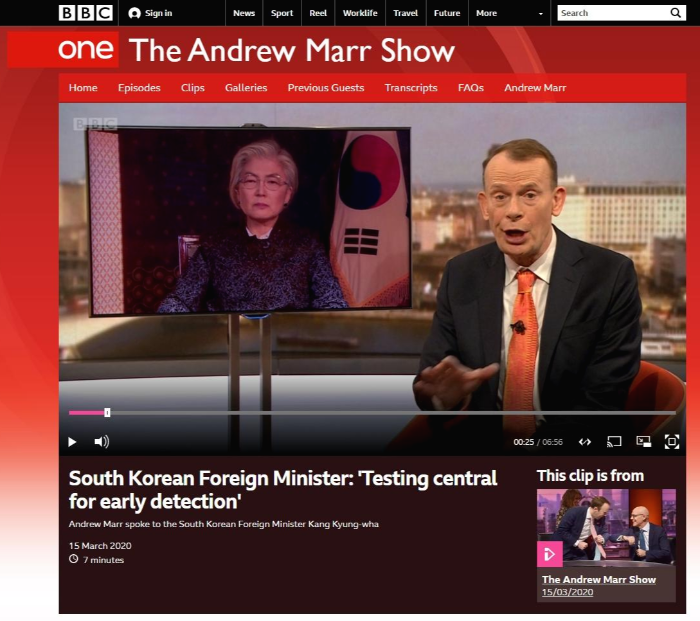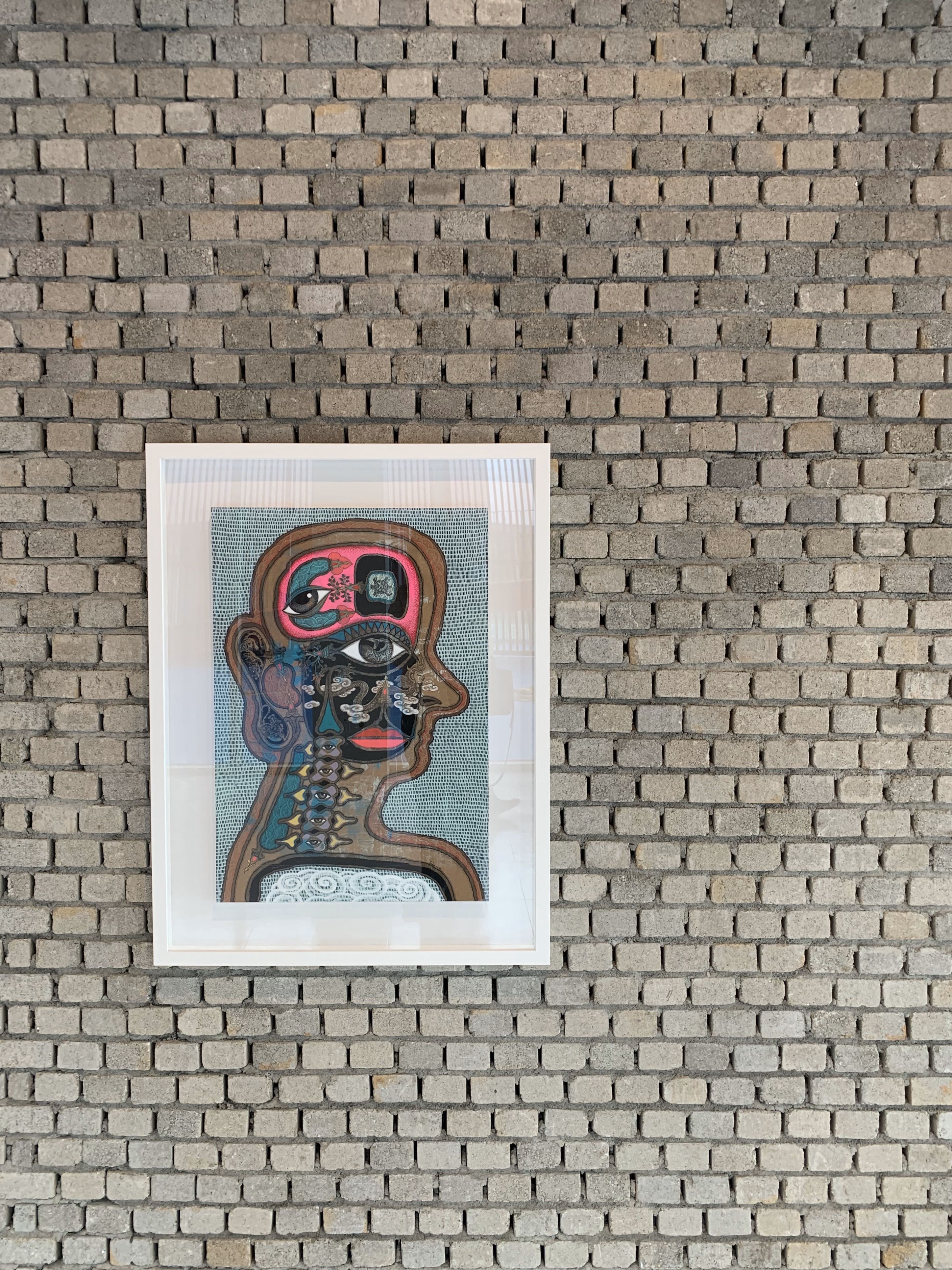티스토리 뷰
BBC의 Andrew Marr Show에서 한 강경화 외무부 장관 인터뷰 풀 영상과 스크립트 입니다.
BBC 사이트에 오픈되어 있는 자료이고, 두고두고 보려고 가져와 봤어요~
영어 공부하는데도 좋을 것 같아서 외워볼까~~ 하는데 가능하겠죠? ^^
출처 : https://www.bbc.co.uk/programmes/p086q4fx
강경화 장관 BBC 인터뷰 스크립트
출처 : http://news.bbc.co.uk/2/shared/bsp/hi/pdfs/15032002.pdf
KANG KYUNG-WHA
ANDREW MARR SHOW
15TH MARCH 2020
KANG KYUNG-WHA
SOUTH KOREAN FOREIGN MINISTER
AM: Foreign Minister, thanks for joining us.
You have, as a country, adopted a particular strategy towards this.
Just explain to us the basis of your strategy.
KK-W: Yes. Well, the basic principle is openness, transparency and fully keeping the public informed. And I think this is paying off.
We have a very good healthcare system to begin with.
We have a system that is highly wired, as you can imagine, and fully utilising that we have dealt with this outbreak from the very beginning with- you know- full transparency, and that’s the way we’ve won the public trust and support for this.
And as you say, we are seeing a stabilising trend.
For three days in a row the number of newly-confirmed positive cases is smaller than the number of those fully cured and released.
AM: You’ve also got the most extraordinary testing system.
You’re testing, I think, 20,000 people a day, which is far more than any other country of your size.
How have you managed to achieve this and why is testing central to what you’re doing?
KK-W: Well, first of all, testing is central because that leads to early detection.
It minimises further spread and it quickly treats those found with the virus.
And I think that’s the- that’s the key behind our very low fatality rate as well.
I think our system quickly approved the testing system.
After the Chinese authorities released the genetic sequence of the virus in mid-January, our health authorities quickly conferred with the research institutions here and then shared that result with the pharmaceutical companies who then produced the reagent and the equipment needed for the testing.
And so I think our testing is nearly a quarter of a million at this point, 268,000 as of today.
AM: That’s remarkable.
The other thing you do, of course, is that you monitor people afterwards.
You’re not going into the same kind of lockdown, social exclusion that a lot of European countries are, but instead you’re monitoring people by phone app.
Again, can you explain why you’re doing that and not closing down large chunks of your country?
KK-W: Well, I think this is being faithful to the values of our very vibrant democracy, which is open and you know, the government fully in the service of the people.
And I have to say our public is very demanding and you know expects the highest standards from government services.
And I think this is the key, the drive of our response to this.
You know, we are monitoring very closely the inbound traffic.
We have also put in place vetting of out-bound traffic so that we minimise the risk coming in from the in-bound traffic but also make sure that we do our very best to contain the spread within country but also taking steps to vet those with possible symptoms among those who are leaving the country.
AM: The number of new cases is slowing down.
Do you think you’re over the worst now?
KK-W: Well, the peak of new cases was in late February when we had over 900 new confirmed cases. That has now come down to 76 new cases as of today. So yes, we are definitely seeing a normalising trend, a reduction of new cases.
But of course we’re not complacent.
This is not just about us and we are taking this approach of openness and transparency, not just domestically but to the international community, because we are a country that is highly interdependent with the rest of the world.
Our people travel a great deal on business, on family visits, on tourism. Our economy depends on this interdependency with the outside world, so we want to keep the doors open with the other countries. And so, as this disease spreads to many more countries we’re watching very closely and we’re committed to maintaining our open approach.
It may not be applicable in other countries with less IT infrastructure and other values, but I think in the end we have to acknowledge that this is not going to be the last time a novel pathogen becomes a global health threat.
So we hope that our experience and our approach and model informs other countries dealing with this COVID-19, but also leading to greater international collaboration for better preparedness when this comes around the next time.
AM: As it will, in your view. This is not the end, even if you get through this it’s not the end of the episode, it’s the beginning of a new way of living almost.
KK-W: Yes. One thing I also would like to point out, as governments, we also have to guard against panic.
I think governments have to be cool-headed about this and do what we do based on evidence and science. Because I think the declaration of the pandemic by the WHO risks turning the spread of the virus into a spread of fear and phobia.
I can’t tell you how many incidents I get reports of, Asians, not just Koreans, being verbally abused, even physically attacked in other countries.
And this, governments have to take responsibility to stop this kind of incident because that is not helpful to generating the spirit of collaboration that we absolutely need to overcome this challenge together globally.
AM: Indeed. Minister, thanks very much indeed for talking to us this morning. (ends)

2020/03/17 - 강경화 외교부 장관 Andrew Marr Show BBC 인터뷰와 현지반응. 멋짐폭발!
'영상. 나를 위한 스크린' 카테고리의 다른 글
| [넷플릭스] 아쉬운 킹덤 시즌2...... 중전 인스타가 더 재밌음. (8) | 2020.03.20 |
|---|---|
| [넷플릭스 추천] How to get away with murder 시즌 1(feat. 말빨이란 이런 것) (1) | 2020.03.19 |
| [플라이트 플랜] 조디포스터와 비행기 내부를 보는 즐거움. 영화추천 (4) | 2020.03.05 |
| 나이브스 아웃(Knives out 2019), 오랜만에 재밌는 추리물 (4) | 2020.02.24 |
| 넷플릭스 업데이트. 방금 공개했거나 공개예정인 작품 선별 (4) | 2020.02.21 |
